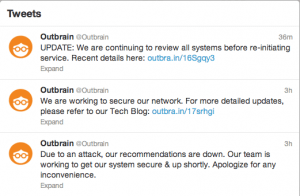The Syrian Electronic Army recently found a new way to hack major media websites, breaching a news recommendation engine that appears on the pages that contain news article.
The group, which supports Syrian President Bashar al-Assad, hacked into Outbrain, a service which recommends other articles to read. Through the service, they managed to hack into the web pages for CNN, Time and the Washington Post.
The group took credit for the hack in a Tweet, saying it had attacked the three media organizations “in one strike” by going through Outbrain.
None of the media sites were taken down, although they did briefly suspend use of the Outbrain service. Outbrain took down its tool for part of the day.
The cyber attack is the latest in a string of such incidents that have targeted major media outlets as well as government websites. The flurry of activity by cyber criminals highlights the need for cyber security experts. Earning a degree in the field is now an option at many universities, both online and through traditional on-campus classes.
According to the Washington Post, the Syrian Electronic Army emerged in April 2011 in the wake of anti-al-Assad protests in Syria. Experts believe the group is a combination of computing experts, who might be getting paid for their hacking work, and younger Syrians who truly believe in the al-Assad regime.
They often use English vernacular in their messages, including using phrases like “haters gonna hate” in their Tweets.
In the past, they have spammed people with pro-al-Assard messages. Eventually the group’s techniques turned more sophisticated, including Distributed Denial of Service attacks that keep people from accessing sites by jamming them with too many traffic requests.
They also have battled online against the hacker group Anonymous, according to the Washington Post.
The Washington Post also reported that the Syrian Electronic Army used a “sophisticated phishing” attack to get the password to a personal Twitter account of a staff writer, and then used the account to send out a message (a common tactic of the group).
Additionally, the group also has taken credit for hacking the New York Post’s Facebook page and also the Twitter feeds of some of that newspaper’s reporters, as well as hacking the social media sites and blog of SocialFlow, a social media content manager.
In the past, the group has also taken credit for hacks of the BBC, The Financial Times, The Associated Press, CBS News, NPR, Columbia University and Human Rights Watch.






